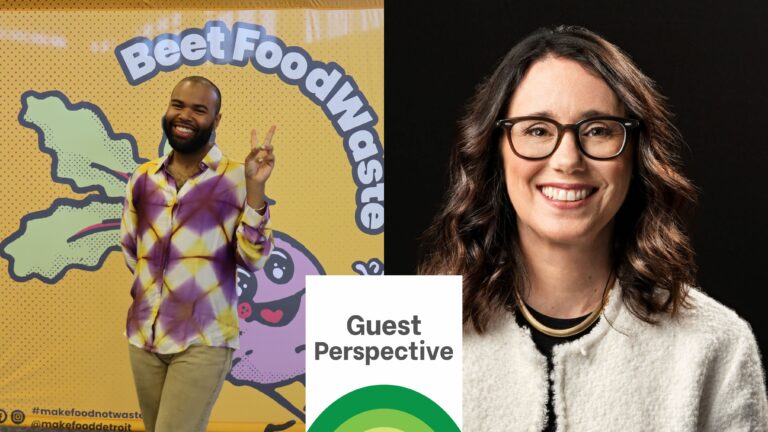
Danielle Todd of Make Food Not Waste: Shares Continuing to Waste our Resources is Not Something We Can Live With

DANIELLE TODD, IS THE EXECUTIVE DIRECTOR OF MAKE FOOD NOT WASTE
Landfilled food is one of the primary sources of climate change due to two main reasons.
- First, food decomposing in landfills emits methane, a greenhouse gas 25 times more potent than carbon dioxide.
- Second, landfilled food represents a waste of land, water, and transportation resources that cannot be reclaimed.
Given the substantial volume of food we send to landfills, methane emissions are skyrocketing and our resources are depleting at an alarming rate.
Annually, Michiganders discard more than 2 billion pounds of food, resulting in approximately one-third of our landfills being composed of food waste.
This excessive waste leads to the negative impacts of extreme weather such as flooding and power outages. It deteriorates air quality, threatens our food supply, and endangers vital plants and animals. Consequently, the State of Michigan, along with the U.S. government and the United Nations, has set a target to halve food waste by 2030. However, with 2 billion pounds of food still being landfilled annually, achieving this goal within six years presents a major challenge.
Despite the fact that the problem is so great, eliminating food waste from our landfills is not all that difficult compared to other climate-related changes we need to make. Yes, it’s something we all must do, but it’s also something we all can do.
According to the United Nations, more than half of the food waste comes from our homes. That means all of us can make a huge difference in this issue by changing how we handle food in our kitchens. For a fun way to get started, join our 7 Day Food Waste Challenge. You’ll learn the basics and begin to set up some habits that will drive down the amount of food you throw away.
Of course, food waste happens outside of homes too. And if we’re going to reach the State’s goal in less than six years, we need a concerted plan. That’s why Make Food Not Waste has launched The 2030 Project, focusing on Southeast Michigan, the region with the highest population density. Concentrating efforts in this area is strategic, given that a larger population corresponds to greater amounts of waste. The project’s objective is to divert all food waste from landfills in the top 15 cities in the region. By collaborating with 17 local and national partners, Make Food Not Waste is crafting a detailed plan incorporating best practices in food waste reduction from across the country.
The project’s approach underscores two critical principles: first, there is no singular solution to food waste. Second, we can only stop food waste by working together. While skeptics may argue that completely eliminating food waste from landfills is unattainable, we feel otherwise. It does not require the invention of groundbreaking technology or a defiance of natural laws. Rather, we simply need to stop throwing our food in the garbage.
While establishing infrastructure, logistical frameworks, and educational programs pose challenges, they are not insurmountable. The alternative—continuing to waste our resources and make our planet hotter – is not something we can live with.
Learn more at www.makefoodnotwaste.org.
Be sure to subscribe to our newsletter for regular updates on sustainable business practices in and around Detroit.
Guest
- All
- Business
- Community
- Education
- Events

Unique Monique Scented Candles, a Detroit-based business founded by Monique Bounds., aims to produce candles and household products with clean ingredients and local supply chains. What began as a personal hobby during college has evolved into a full-time venture producing coconut oil and soy-based candles made with essential oils and locally sourced materials. SBN Detroit interviewed Bounds about launching a sustainable product line, sourcing challenges in Michigan, and...

Eastern Market Partnership, in collaboration with the City of Detroit’s Office of Sustainability Urban Agriculture Division, has announced $240,000 in grant funding to support Detroit-based farmers and farmer collectives. The grants will advance food access, climate education, sustainable land use, and economic opportunity, with priority given to Black- and Indigenous-led farms, youth-led initiatives, and projects rooted in historically disinvested neighborhoods. The recipients – ranging from cooperatives and community...

Citizen Robotics is a Detroit-based nonprofit that advances the use of robotics and digital manufacturing in residential construction, focusing on improving productivity, sustainability, and long-term affordability. Best known for its early work in 3D-printed housing, it explores how alternative construction methods and new financial models can reduce material waste, lower lifetime operating costs, and enhance the resilience of homes. SBN Detroit interviewed Tom Woodman, founder and president of...







